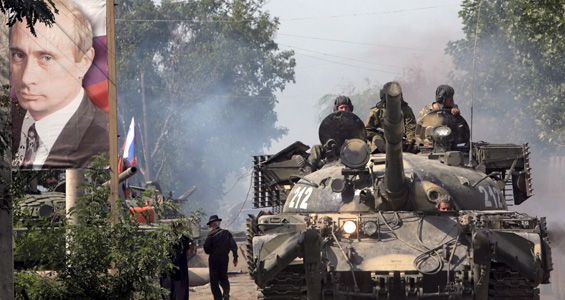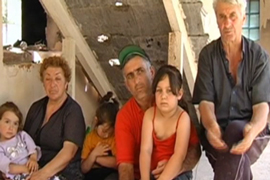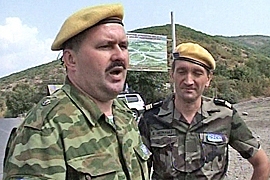‘We live under constant threat’
International observers leave Georgia amid fears of renewed conflict with Russia.

 |
| Many fear renewed hostilities between Russia and Georgia after last year’s war [EPA] |
In the frontline village of Ergneti, red and white roses bloom next to the smoke-blackened shells of what were once people’s homes.
Nearby, at a fortified checkpoint, Georgian interior ministry forces stand almost face to face with their Russian and South Ossetian enemies.
| In video | ||
|
|
The opposing sides’ flags have been raised just metres from each other; a symbolic reminder of a political stand-off which remains highly volatile more than ten months after last year’s war.
Apart from birdsong, the only sound comes from the engines of armoured vehicles and the bomb-shredded metal roofs of houses creaking gently in the summer breeze.
“At night it’s terrible, because you can hear all the burnt metal rattling in the wind,” says a Georgian farmer who was sitting next to the ruins of his home.
Like tens of thousands of others, Jemal Doijashvili and his family fled during the war, but later returned to live in the only undamaged room in their shell-scarred house.
They have no water, no electricity and no work, but Jemal offered green plums from his orchard as he took refuge from the midday heat beneath the shattered remnants of an ornate staircase.
|
“The security situation is unstable, there is shooting at night and people are afraid”
Terhi Hakala, head of the OSCE mission to Georgia |
“What kind of life is this?” he asks angrily. “We’ve lost everything we had. For years, I was working, trying hard, and in a second, everything disappeared.”
Since the early 1990s, the conflict zone in and around the disputed region of South Ossetia has been patrolled by monitors from the Organisation for Security and Co-operation in Europe, but now the mission is closing after OSCE member Russia opposed the extension of its mandate.
Jemal says that villagers living close to the ceasefire line are already worried about the possibility of renewed hostilities between Russia and Georgia, and the departure of the OSCE monitors is making them feel even more insecure.
‘Chaos will start again’
“These people were supporting peace, they wanted to establish peace here. When they’ve gone, some kind of chaos will start again,” he predicts.
In the coastal region of Abkhazia, where there was also fighting last August, the United Nations’ mission to Georgia is also preparing to leave, after Russia vetoed the extension of its mandate at the UN Security Council.
This means there will no longer be any international monitoring of the disputed territories at the heart of the Georgia-Russia conflict.
 |
| Doijashvili [far right] says villagers in Ergneti are living ‘under constant threat’ of conflict |
Moscow insists that the international community must take account of the “new realities” in the region, and that observer missions operating in Abkhazia and South Ossetia should no longer be based in Georgia.
The Kremlin argues that Georgian claims to both regions were invalidated after it attempted to seize control of South Ossetia by force last year. The Russian army crushed Georgian forces and pushed deep into the region.
Russia then recognised the two territories as independent states, and offered them protection by deploying thousands of troops and starting to build military bases there.
The Moscow-backed authorities in both Abkhazia and South Ossetia supported the move to end the Georgia-based UN and OSCE missions.
“We see our major security guarantee in relations and military co-operation with Russia,” says Abkhazia’s foreign minister, Sergei Shamba.
But Grigol Vashadze, the Georgian foreign minister, alleges Russia does not want international observers to scrutinise the “ethnic cleansing” and “occupation” of what Georgia regards as its sovereign territories.
The International Crisis Group, a Brussels-based think tank, also warns that the observers’ departure will heighten tensions and create “a dangerous atmosphere in which extensive fighting could again erupt”.
‘Explosive situation’
“When you have the lack of an effective security regime, you have no diplomatic relations between Russia and Georgia, you have a lack of trust in general – all these things add up to a potentially explosive situation, unfortunately, which the West should be paying more attention to,” says Lawrence Sheets, the International Crisis Group’s Caucasus project director.
Sheets also argues that Russia has violated the ceasefire agreement by refusing to pull its troops back to their pre-war positions and sending additional forces into Abkhazia and South Ossetia.
However, Moscow insists that it is simply protecting the regions against further “Georgian aggression”.
The presence of international observers did not prevent last year’s war, but the head of the OSCE mission to Georgia, Terhi Hakala, believes they could still provide a “feeling of security”.
 |
| Since the 1990s, OSCE observers have patrolled the disputed region of Ossetia |
“The situation is very fragile, the security situation is unstable, there is shooting at night and people are afraid,” she warns.
Hakala said that ordinary people in the conflict zones will suffer “because of the decisions of politicians and the lack of political will on the ground”.
Over 200 European Union monitors will remain in Georgia after the OSCE and UN missions have gone, but they too have not been allowed to enter Abkhazia and South Ossetia.
“Abkhazia and South Ossetia were already quite isolated, and the Georgian government often didn’t help with that by trying to isolate them, but now you have a situation where international engagement is ending, and that is very ominous for the security of the region,” says Lawrence Sheets of the International Crisis Group.
In the village of Ergneti, where lush vines curl languidly around the rusting debris of battle, Jemal Doijashvili and his family may have to get used to a life of what he describes as “unbearable” insecurity.
“We had nowhere else to go, so we took the risk of coming back here,” he says.
“We’re living under constant threat. Any night, they could come and destroy us.”
